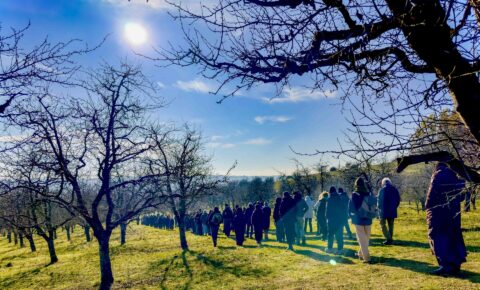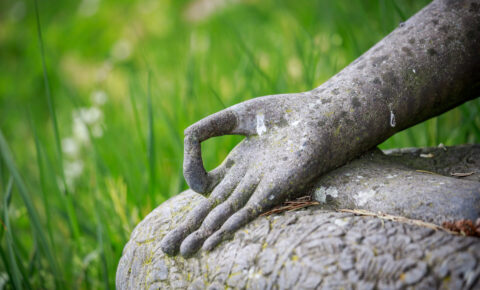Thay’s 2008-09 Teachings on Ethics – Talk 2 – Rains 2023
Dear friends, In this talk by Thay, we look at the root cause of ill-being, and to see that the transformation of ill-being is free will. We will continue to share related videos, excerpts, and reflection questions throughout the coming months.
Your steps and breaths are two very effective ways to help you have sovereignty over your body and mind. Otherwise, you are carried away by the agitations of daily life.
When we make use of our mindful breath and steps to bring the mind home to the body, we begin to have some sovereignty. Then, we walk because we want to walk, not because we are being pulled. We speak because we want speak, not because we are possessed to talk.
In philosophy people ask, “Is there free will?“
In Buddhism, we know that if you are mindful, you begin to have sovereignty, you have freedom. The more powerful your mindfulness and concentration becomes, the greater your freedom becomes.
I have a lot of happiness thanks to the practice of mindful breathing and mindful walking. Usually, I use some practice poems such as “The Island Within”, harmonizing breathing and steps with the words. The practice poems help us to prolong and keep our concentration alive.
Happiness is now or never
The Plum Village teachings and practices are present-centered. If you are looking for good health, even if you are not well, when you can stop in the present moment, when you know how to breathe and how to walk, your body and mind can benefit from the refreshing, wholesome and nourishing elements in the present. And that is already an improvement on your health.
Don’t hang your hopes on something in the future. If you can’t be happy now, what are the chances of you being happy in the future?
When we produce a thought that’s upsetting, we’re aware, “Ah, this is an upsetting thought. It is not good for my health, not good for my happiness.” And like that, we have agency.
A disturbing thought can be there, but we know: This is a disturbing thought. And at that moment we have agency, because we are mindful.
The real ill-being of today
The energy of violence is there in us. The irritation, anger, the wish to retaliate and destroy, to inflict pain, to punish. Terrorism contains violence, but anti-terrorism also contains violence.
When I was visiting South Korea on a teaching tour, I participated in a peace gathering organized by an inter-faith group. At the time, Iraq hadn’t been invaded, but the US had already begun to send their warships to the surrounding area and everyone knew an invasion could happen at any time.
At the peace gathering, I said, “Suppose you were a civilian living in Baghdad, an adult or a child, and you knew that in a matter of hours bombs will drop on your city. Everyone in the city would be living in constant fear not knowing when your city would be attacked, or when the bombs would fall on you.
If you live just 24 hours in constant fear like that, your health deteriorates, let alone living night after night, month after month like that.
That is a kind of terrorism. Terrorism is not coming from only one side. Both sides have committed acts of terrorism. And it’s the people who have to pay the very high price. These are real ill-beings of our time and we have to call them by their true name.
The making of ill-being
Why is there so much tension in the body?
Our lives are too busy. We want to do too many things. We are always being pulled towards the future. We are not truly there in the present moment to take good care of ourselves, to relax and remove the tensions. Instead, we allow the tension to accumulate until it gives rise to many diseases.
We have to reorganize our daily lives in such a way that when we walk, breathe, and work, we can relax.
We have time to do sitting and walking meditation. Every night if we practice relaxation we can sleep better.

The issue of violence is related to tension and stress. If we’re not stressed, we can remain calm, we can resolve issues in gentler ways.
The way we live has led to ill-being. A way of living based on wrong view.
You have a view that differentiates, that’s dualistic, that discriminates – “Their happiness is not my happiness. Their suffering is not my suffering.” Meanwhile, the truth is that when they suffer, it’s impossible for you to be happy.
Wrong view is the inability to see the nature of impermanence, non-self, and inter-being of all that is.
The root cause of ill-being
The root cause of ill-being is wrong view.
Palestinians must be able to see that the pain and suffering of Israelis is their own pain and suffering. And Israelis must also be able to see that for Palestinians. It’s the same with father and son, with Americans and Iraqis, with Muslims and Hindus.
To see that both sides inter-are, that the suffering of the other person is our own suffering. That is right view. Where there is no right view, there is fear and violence, war and terrorism.
Ethics is the ability to discern right and wrong
As a practitioner, we must have right view. If our view is wrong, our thinking will also be wrong. When our thinking is wrong, it leads to anxiety, worries, fear, and violence.
Likewise, there can be wrong mindfulness and wrong concentration. When you are always thinking about how to pursue wealth, power, prestige, and sex; always running after the objects of your craving, you have wrong mindfulness.

You are never there in the present moment.
How can you take care of yourself and your loved ones?
2023 October. Bethlehem (West Bank)
When wrong mindfulness is strong, it leads to wrong concentration. Wrong mindfulness and concentration feed wrong view and wrong view feeds wrong mindfulness and concentration. They go in circles.
Perhaps the Second Noble Truth can be defined, for the first time, as the Ignoble Eightfold Path leading to ill-being.
Free Will – cutting off the root of ill-being
The Third Noble Truth is the cessation of ill-being, the transformation of a way of living based on the wrong path, the ignoble path.
With right mindfulness we can remove wrong mindfulness and we come to right concentration and right view. The acknowledgement that we can transform this way of living is proof that we do have free will.
According to Buddha Shakyamuni, free will is possible. It begins with mindfulness, and we are all capable of drinking tea in mindfulness, walking in mindfulness, breathing in mindfulness. These are very concrete practices that can help us establish our freedom and make it greater, so we can stop being lost.
Excerpt from Thich Nhat Hanh’s 2008 November 23 teaching –
Loving Kindness Temple, Plum Village France
Home Practices
- How do you walk and breathe in your daily life to not be carried away by the agitations of life?
- What are concrete ways that allow you to release tension and stress in daily life?







Share with us your reflections